by Mary Ratcliff
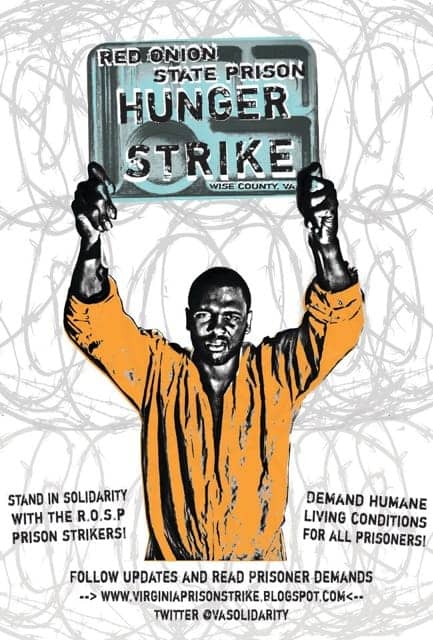 On May 22, brave prisoners at Virginia’s Red Onion State Prison began a hunger strike. Their decision to starve themselves in an effort to be heard is the latest in a recent series of prison strikes, one of the very few forms of peaceful recourse available to prisoners to protest intolerable conditions.
On May 22, brave prisoners at Virginia’s Red Onion State Prison began a hunger strike. Their decision to starve themselves in an effort to be heard is the latest in a recent series of prison strikes, one of the very few forms of peaceful recourse available to prisoners to protest intolerable conditions.
The series started Dec. 9, 2010, with a sit-down strike by thousands of prisoners in Georgia, tired of being forced to work for free like slaves, followed by Lucasville prisoners’ hunger strike at Ohio State Penitentiary in January 2011 and the mass hunger strikes in California beginning July 1, 2011, that involved 12,000 prisoners in 13 prisons simultaneously refusing food at their peak. Hunger strikes worldwide, from Palestine, where prisoners acknowledged being inspired by their peers in California, to Kyrgysztan, where prisoners literally sewed their mouths shut, have followed.
Red Onion State Prison in rural Virginia sits in the barren crater of a formerly lush green mountain whose top was blown off to remove the coal that used to be mined the old-fashioned way. Built in 1998, it’s the new economic development model for Appalachia: mountaintop removal covered by prisons and Wal-Marts, now the only job options for out-of-work miners and their families, according to JJ Heyward, a veteran activist who volunteered at the Bay View before moving to the East Coast.
Now the miners who used to mine “black gold” – coal – mind Black prisoners. Heyward says that Washington, D.C., has no prisons, so anyone sentenced to five years or more is shipped out of state, often to Red Onion, culturally a world away. Creative activists to the rescue, the staff of WMMT Mountain Community Radio in Whitesburg, Kentucky, broadcast a show connecting prisoners and their families back home that can be heard in Red Onion and seven more state and federal mountain prisons plus many regional jails and detention centers.

The show, now called Hot 88.7 – Hip Hop from the Hilltop and Calls From Home, airs Mondays 9-10 p.m. Eastern Time (6-7 p.m. Pacific Time). Go to WMMT to listen live. This week’s show will focus on the Red Onion hunger strike. Call 1(888) 396-1208 to record your message between 7-9 p.m. (4-6 p.m. PT) on Monday for broadcast that night.
A statement released by one of the hunger strike representatives says: “Regardless of sexual preference, gang affiliation, race and religion, there are only two classes at this prison: the oppressor and the oppressed. We the oppressed are coming together. We’re considered rival gang members, but now we’re coming together as revolutionaries. We’re tired of being treated like animals.”
After exhausting legal and administrative remedies, the Red Onion prisoners issued 10 demands (printed in full below) and vowed to starve themselves until their demands are met. They include the right to have fully cooked meals, the right to clean cells, the right to be notified of the purpose and duration of their detention in segregation and a call for an end to indefinite segregation. Red Onion has been repeatedly criticized since it opened in 1998. A 1999 Human Rights Watch report on Red Onion concluded that the “Virginia Department of Corrections has failed to embrace basic tenets of sound correctional practice and laws protecting inmates from abusive, degrading or cruel treatment.”
Torture, Red Onion style
I first heard of Red Onion when Kevin “Rashid” Johnson, a nationally known prison writer and artist often compared to George Jackson, designed what became the symbol of the California hunger strikes. It shows black, brown and white arms clasped together indicating racial unity around a fork and spoon on a map of California crossed out as in a “no smoking” sign.
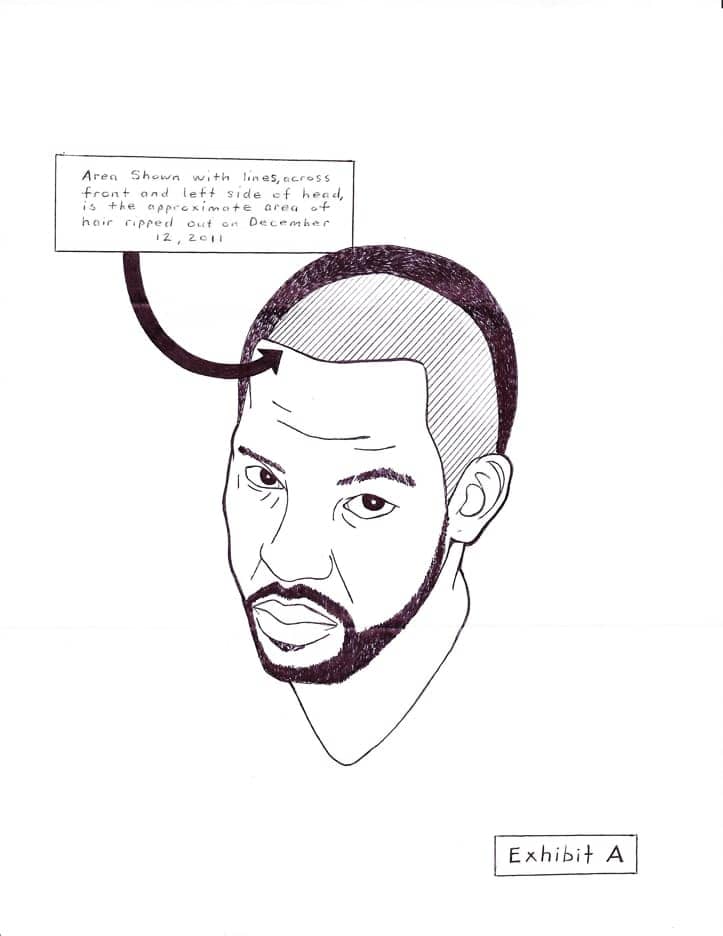
Mac Gaskins, a prisoner at Red Onion for 14 years released only last June, was interviewed May 22, the day the hunger strike began, on Voices with Vision on Pacifica station WPFW in Washington, D.C. Listen to the show here and read the transcript of the entire interview below, following the 10 demands.
Mac discusses torture at Red Onion: “having your fingers broken inside of these places, being bitten by dogs, being strapped to beds for days, as we’ve talked about many times, being forced to defecate on yourself – I mean all of this has led to these men demanding to be treated as human beings. It’s like if you are put inside prison, you forfeit that right to be treated as a human being. …
“Access to adequate medical care inside of prison, especially in supermax prison, it’s almost nonexistent. You have men there, they have chronic illnesses that aren’t being treated. There was one guy when I was at Red Onion, he died from undiagnosed advanced diabetes. This guy had diabetes for years and he was never diagnosed. …
“So maybe your fingers were broken, as mine were multiple times at these places, and then you’re denied any sort of medical care. Your bones are never reset, any of that. It’s like they don’t even have medical staff at the prison.
“They come in with riot gear – I’m talking about jump boots, shields, dogs, pepper spray – to assault you. Maybe eight men come in. They wrestle you down.
“You’re totally subdued – handcuffed, shackled – and then they proceed to break your fingers. They bend them back one by one, trying to break as many of your fingers as they can. They try to break your toes. And the whole time they are yelling out, ‘Stop resisting! Stop resisting!’ to make it look like you’re the one who is escalating the situation.
“When you’re taken out, they put the spit mask on your face ‘cause they usually bust your face up pretty bad. They put the spit mask on so the camera can’t see the damage that has been inflicted. The nurses come over allegedly to assess the damage.

“I have watched men eat feces in prison; I’ve watched men throw feces on each other. I would hear men in their cells screaming at night, basically just escaping to some place of insanity. They are driving men insane. …
“At Red Onion, all of the light is artificial in your cells – there are no windows in the cells – and it’s total sensory deprivation. So they asked this guy Ron D’Angelo, how do you justify sending men here? There are no educational programs, no vocational programs, men are just rotting and deteriorating in these places. …
“He said, ‘We didn’t bring these guys up to the mountains to rehabilitate them; we brought them to the mountains to die.’ …
“Now at Red Onion and Wallens Ridge, they are taking away books for guys that are in segregation. You have to meet a certain behavioral criteria to receive books. So, for guys in the old days like George Jackson, that was their only escape. Now you don’t even have that. They have taken that away.”
How you can help
Call WMMT’s Calls From Home show to give a shout out of support to the hunger strikers. The Monday, May 28, show is especially critical; it’s the first since the strike began and will air the 10 demands of the hunger strikers. Prison officials are likely to respond by removing all prisoner radios before the next Monday show, so this will be the last chance to let these brave men know we are out here standing in solidarity with them and doing our best to make their voices heard.
In order to preserve the longevity of the show – which is an important method by which men receive messages weekly from their loved ones back home – WMMT is asking everyone calling in to be conscious of some constraints on what you say:
- Don’t mention the pending ROSP hunger strike directly.
- No cursing!
- Don’t mention any of the men by name.
- Don’t make your statement a call to action; this is considered inciting a riot by officials and will give them fuel to impose restrictions on access to the show in the future
They suggest that you:
- read a quote from a hunger striker in California, Ohio, Palestine or elsewhere.
- offer vague solidarity and support for the “struggle”; those who need to know will know what you’re talking about.
- read a short quote from George Jackson, their most beloved revolutionary, or other revolutionary figure.
- keep it short; 50 short messages will be a more powerful display of support than fewer long messages. The men need to know that there are many people out here standing in solidarity.
Calls are taken and recorded from 7-9 p.m. ET (4-6 PT) and then these calls are aired from 9-10 p.m. ET (6-7 p.m. PT). The number to call is (606) 633-1208 or 1(888) 396-1208 to give a shout out. You can listen to the show live at http://appalshop.org/.
Write to Virginia prisoners to spread the word. Red Onion is a supermax prison; prisoners are isolated and communication among them is difficult. Supporters are calling for volunteers to send short, personal, creatively written letters into everyone in the Virginia prison system they have contact information for to inform them of what’s going on. Email katherinecolespiper@gmail.com or JJ Heyward at tortakin@gmail.com for prisoners’ names and addresses. The VDOC (Virginia Department of Corrections) will try hard and fast to silence this and keep the hunger strike from spreading as it did in California. We need to be harder and faster.
Call Virginia officials who have the power to meet the hungers strikers’ demands:
- Gov. Bob McDonnell, Robert.F.McDonnell@Governor.Virginia.Gov, (804) 786-4273
- Virginia Corrections Director Harold W. Clarke, Harold.Clarke@VADOC.Virginia.Gov, (804) 674-3118
- Red Onion State Prison Chief Warden Randall Mathena, Randall.Mathena@VADOC.Virginia.Gov, (276) 796-7510
- Western Region Corrections Operations Chief G.K. Washington, GK.Washington@VADOC.Virginia.Gov, (804) 674-3612
Sample phone call or email: Hello, I’m calling to express my support for the hunger strikers in Red Onion State Prison. These men are on hunger strike to call attention to inhumane conditions at Red Onion, from fully cooked meals and medical attention to sanitary living conditions and an end to solitary confinement. We demand an immediate response to the strikers’ demands. Red Onion has a long history of public scrutiny for conditions, and we, the broad movement to support the Red Onion hunger strikers, won’t let up until their demands are met and until Red Onion guarantees that there will be zero retaliation on the hunger strikers.
Sign the petition in support of the Virginia hunger strikers at http://www.change.org/petitions/grant-the-ten-demands-of-the-hunger-strikers-at-red-onion-state-prison. Sign and share!
Stay updated at http://virginiaprisonstrike.blogspot.com/ and, on Facebook, Solidarity for Virginia Prison Hunger Strikers.
The Red Onion hunger strikers, like those who preceded and will inevitably follow them, are dead serious. Their support website, Solidarity with Virginia Prison Hunger Strikers, reports the participants are in good spirits and are encouraged by the outside attention and response to their call for solidarity and support from their communities.
In addition to refusing to eat, the men are also refusing the three weekly showers they are allowed and the one hour of recreation they are permitted each day. They do not want to leave their cells until they are able to talk with a third party outside observer.
On the first day of the strike, strikers in one of the segregation pods were informed that the phone in their pod had “broken.” The same day, one striker was moved from his pod to a different pod in segregation and was threatened with losing his prison job and being charged with a false charge if he did not stop striking.
Strikers expect they will soon be split apart into separate pods (or cell blocks) in an attempt to break the strike. While being separated is not ideal, strikers also realize this could help them to spread word about the strike.
In the words of veteran prisoner advocate Marpessa Kupendua, “We must support these courageous comrades who are actively revolting against the incarceration nation. Go to http://virginiaprisonstrike.blogspot.com and take action!”
Ten demands of ROSP hunger strikers
We (prisoners at Red Onion State Prison) demand the right to an adequate standard of living while in the custody of the state!
1. We demand fully cooked food and access to a better quality of fresh fruit and vegetables. In addition, we demand increased portions on our trays, which allow us to meet our basic nutritional needs as defined by VDOC regulations.
2. We demand that every prisoner at ROSP have unrestricted access to complaint and grievance forms and other paperwork we may request.
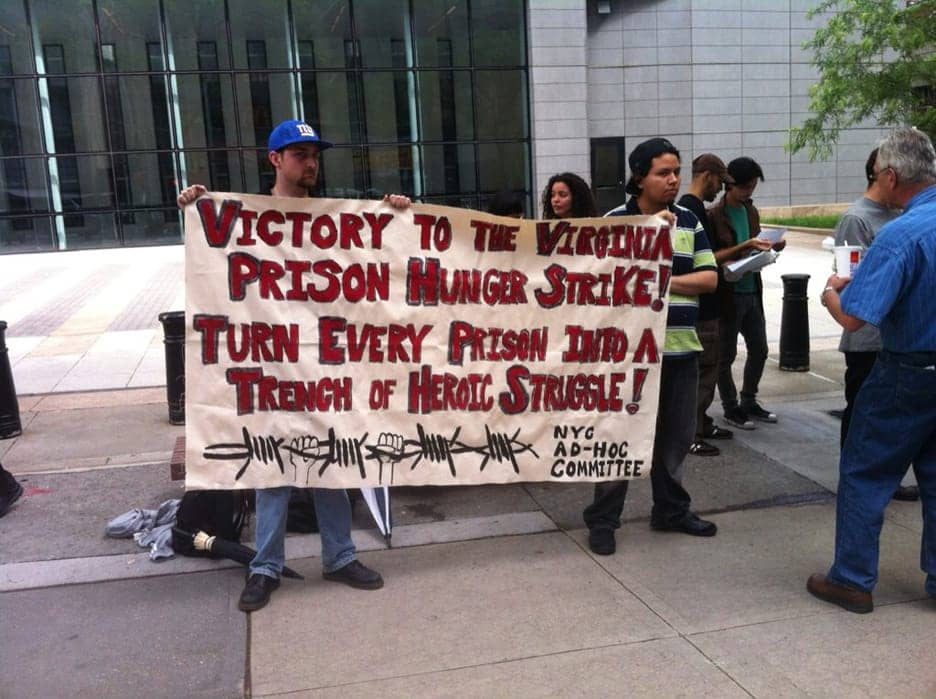
4. We demand an end to torture in the form of indefinite segregation through the implementation of a fair and transparent process whereby prisoners can earn the right to be released from segregation. We demand that prison officials completely adhere to the security point system, insuring that prisoners are transferred to institutions that correspond with their particular security level.
5. We demand the right to an adequate standard of living, including access to quality materials that we may use to clean our own cells. Presently, we are forced to clean our entire cell, including the inside of our toilets, with a single sponge and our bare hands. This is unsanitary and promotes the spread of disease-carrying bacteria.
6. We demand the right to have 3rd party neutral observers visit and document the condition of the prisons to ensure an end to the corruption amongst prison officials and widespread human rights abuses of prisoners. Internal Affairs and Prison Administrator’s monitoring of prison conditions have not alleviated the dangerous circumstances we are living under while in custody of the state, which include, but are not limited to: the threat of undue physical aggression by guards, sexual abuse and retaliatory measures, which violate prison policies and our human rights.
7. We demand to be informed of any and all changes to VDOC/IOP policies as soon as these changes are made.
8. We demand the right to adequate medical care. Our right to medical care is guaranteed under the Eighth Amendment to the Constitution, and thus the deliberate indifference of prison officials to our medical needs constitutes a violation of our constitutional rights. In particular, the toothpaste we are forced to purchase in the prison is a danger to our dental health and causes widespread gum disease and associated illnesses.
9. We demand our right, as enumerated through VDOC policy, to a monthly haircut. Presently, we have been denied haircuts for nearly three months. We also demand to have our razors changed out on a weekly basis. The current practice of changing out the razors every three weeks leaves prisoners exposed to the risk of dangerous infections and injury.
10. We demand that there be no reprisals for any of the participants in the Hunger Strike. We are simply organizing in the interest of more humane living conditions.
Interview with recently released Red Onion prisoner John ‘Mac’ Gaskins
This interview was broadcast on Pacifica station WPFW’s Voices with Vision, Washington, D.C., May 22, 11 a.m. It was transcribed by human rights advocate Kendra Castaneda.
Ryme Katkhouda: Good morning, Naji. Share with listeners what has been going on with the mobilizations about prisoners?
Naji Mujahid: As we speak, there’s a press conference going on in Richmond, Virginia, to announce the beginning of a hunger strike at Red Onion State Prison. Red Onion State Prison is a maximum security Virginia state prison down in the southwestern corner of the state where there has been a longstanding problem of abuse.
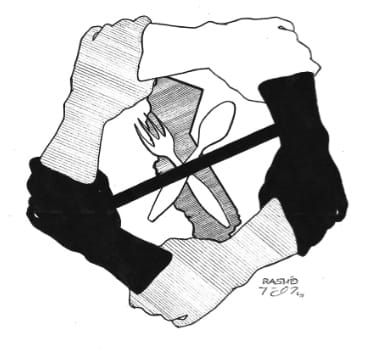
In the studio with us we have John “Mac” Gaskins of the D.C. chapter of SPARC, Supporting Prisoners and Acting for Radical Change, and also somebody who has first-hand experience, having been at Red Onion, and he can speak further to that.
There is a list of 10 demands and the headline of them reads: “We the prisoners at Red Onion State Prison demand the right to an adequate standard of living while in the custody of the state.” And running down the list of demands is real basic stuff; it’s stuff that people shouldn’t have to ask for.
I guess, Mac, you can begin by explaining some of the demands; and one thing that strikes me, having known you and having discussed some of the things going on at Red Onion, you know, this list is kind of tame. It could be miles long but it’s just this basic stuff like toothpaste.
John “Mac” Gaskins: Right, in those prisons, not only in Red Onion, Wallens Ridge, in all those prisons in Southwest Virginia, you’re denied access to basic necessities such as toothpaste, soap. The toothpaste they sell is such low quality they actually sell it in a packet – it’s like a packet of ketchup – and it’s like a dollar. It will last you a couple of days – two days tops. That’s maybe brushing once a day.
All these things from having your fingers broken inside of these places, being bitten by dogs, being strapped to beds for days, as we’ve talked about many times, being forced to defecate on yourself – I mean all of this has led to these men demanding to be treated as human beings. It’s like if you are put inside prison, you forfeit that right to be treated as a human being. So this list is pretty basic. I feel that on this list, medical should be up at the top.
Ryme: What do you mean exactly by medical, Mac? For some listeners, they don’t have a clue about how bad it can be on the inside.
Mac: Access to adequate medical care inside of prison, especially in supermax prison, it’s almost nonexistent. You have men there, they have chronic illnesses that aren’t being treated. There was one guy when I was at Red Onion, he died from undiagnosed advanced diabetes. This guy had diabetes for years and he was never diagnosed.
The guards, which is common practice, they abuse prisoners. One of the demands on here is better communication with prisoners and higher ranking guards. They are demanding that the guards, the higher ranking officials, at least take prisoners complaints into consideration. Because right now they are basically forced to act out in order to get these guys’ attention.
So maybe your fingers were broken, as mine were multiple times at these places, and then you’re denied any sort of medical care. Your bones are never reset, any of that. It’s like they don’t even have medical staff at the prison. It’s totally nonexistent.
Ryme: We always see in the movies, Mac, and for some people that’s their only reference, that there is an infirmary, that there are nurses that are very well dressed and ready to serve you, doctors, and everything looks fine. And we always have this scene – until there is a major uprising – of a really smoothly running prison.
And here you are talking about broken bones and whatever. Where was everybody when your bones were broken? What was going on? Still, give people the story. I know it’s painful, but we need to hear painful. This idea of sugarcoating the world so we don’t see blood about the wars, we don’t hear the pain about what goes on in the prison keeps people complacent and they are not giving support on the outside.
Mac: Yes, yes, I totally agree. So one scenario: Maybe some guy is denied his tray at Red Onion, his meal tray, so he asks for a complaint form, which is totally denied to him. You have to go through the sergeant. They’re not accessible in the office or anything like that. You have to go through the sergeant, and he determines if your complaint is valid or not, which most of the time he’s going to say it isn’t. So maybe this guy floods his cell, which I’ve done, floods his cell or kicks his door to bring attention on himself.
Naji: About flooding his cell, what do you mean, like clogging up the toilet?
Mac: Clogging up the toilet, yeah, and like flooding his cell.
They come in with riot gear – I’m talking about jump boots, shields, dogs, pepper spray – to assault you. Maybe eight men come in. They wrestle you down.
You’re totally subdued – handcuffed, shackled – and then they proceed to break your fingers. They bend them back one by one, trying to break as many of your fingers as they can. They try to break your toes. And the whole time they are yelling out, “Stop resisting! Stop resisting!” to make it look like you’re the one who is escalating the situation.
When you’re taken out, they put the spit mask on your face ‘cause they usually bust your face up pretty bad. They put the spit mask on so the camera can’t see the damage that has been inflicted. The nurses come over allegedly to assess the damage.
My hand looked like a volley ball. I mean you couldn’t even see the definition of my hand. My whole hand was like a ball. The nurse told me I had full range of movement and no bones in my hand were broken.
The medical staff at the prison, they lie to protect the higher ranking officials at the prison. They would not allow me to go out to see an outside doctor. I never had an x-ray done on my hand, any of that.
So the medical staff there, I mean it’s like they are totally in cahoots with the corruption that’s going on inside the prison. There was another guy where the bone in his hand had been totally snapped in half, and only because of that where they forced to take him to the hospital. His family had come in, they saw it, they made a big fuss about it; but only in extreme cases do you have access to doctors or any sort of adequate medical care in prison. At Red Onion, it’s nonexistent.
They have this guy Ron D’Angelo – they asked him once how do you justify keeping a man in these sorts of conditions? Taking them outside to recreation cages that are like dog kennels. If you are about 6 feet tall, you have to duck down to get inside of this cage – very small, maybe half of this booth, not even that. And you go out there maybe four times a week, for about 45 minutes. And that’s at the discretion of the guards, since they have to get two officers, stripsearch you, handcuff you, both walk you outside, so maybe they don’t feel like giving you rec, so they don’t give you rec that day.
Ryme: And this means time to be in the yard outside your cell, right?
Mac: Yes, but not a yard, not a yard. They have this illusion that you’re outside on the yard. At Red Onion there is no yard; they have dog kennels which are inside of the building. They do have the roof cut off where it looks like you are outside, but you are in this plexiglas enclosure that is surrounded by fence, so you’re not outside.
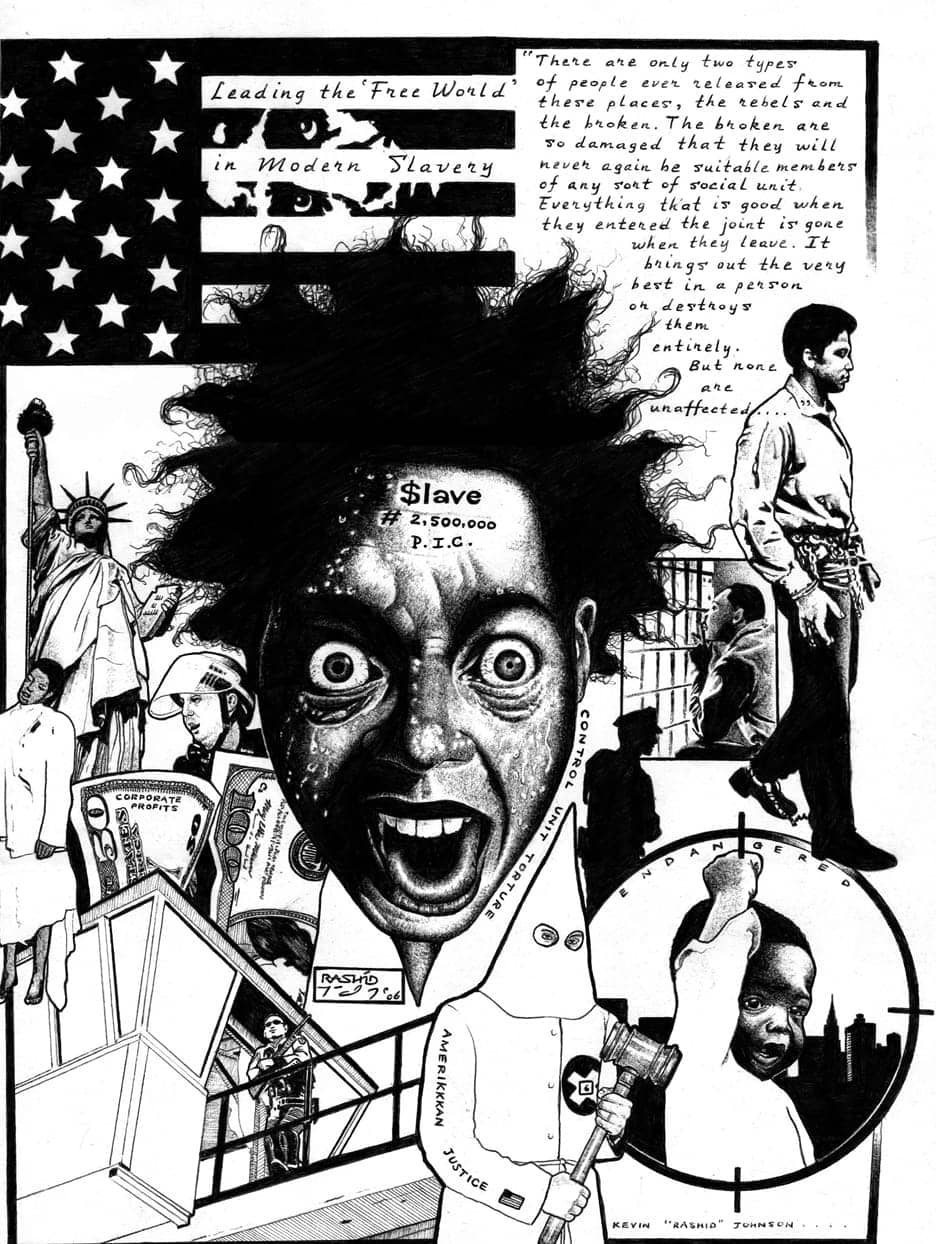
Ryme: What does that do to men mentally?
Mac: It destroys them. I have watched men eat feces in prison; I’ve watched men throw feces on each other. I would hear men in their cells screaming at night, basically just escaping to some place of insanity. They are driving men insane. I think all of us, I don’t think you can live under those sorts of conditions and not be damaged by that to some degree, so I think you slip in and out of insanity. For someone like me, I just happened to escape and still have some sense of sanity but …
Naji: What were you about to say about what Ron D’Angelo said?
Mac: He said, “We didn’t bring these guys up to the mountains to rehabilitate them; we brought them to the mountains to die.”
There’s this good video – if anyone listening hasn’t seen it, they need to see it – it’s called “Up the Ridge.” They have this footage of when they are doing the ribbon cutting for Wallens Ridge State Prison; there’s this big sign on top of it that says something like Future Home of Virginia’s Exiles, basically meaning all of the guys who can’t fit in the legitimate framework of society, this is where we exile them to, a supermax prison
Ryme: You are listening to Voices with Vision on WPFW, Washington D.C., 89.3FM on your dial. We have with us Mac, who is talking to us about the prisoners’ strike and about Red Onion. This was heavy, so you said there are the medical conditions and there’s also the mental pressure that’s put on the men?
Mac: Yes, and there’s nothing. At one point you couldn’t be sent to Red Onion because they didn’t have any sort of services that accommodated someone with a mental illness. But, in the interest of money, even though it’s a state prison, it’s pretty complicated, because Virginia is building prisons to hold prisoners from other states. That’s what this video “Up The Ridge” is all about.
They have one prison called Green Rock, which only has Pennsylvania prisoners. They don’t hold Virginia prisoners. And Red Onion, Wallens Ridge, was doing that to some degree for a while. They had prisoners from New Mexico, Pennsylvania, Wyoming, Virgin Islands, so they wanted to fill those beds.
When they first built the prisons, there was a criteria: You had to be one of the most violent prisoners in the state. But the guys weren’t really meeting that criteria to fill 1,500 beds or something, so they just started lowering what the required criteria was to be sent to a supermax prison so anyone could go.
When they first built the prisons, there was a criteria: You had to be one of the most violent prisoners in the state. But the guys weren’t really meeting that criteria to fill 1,500 beds or something, so they just started lowering what the required criteria was to be sent to a supermax prison so anyone could go.
Naji: I saw the Wallens Ridge documentary; if I remember correctly, like you said it is supposed to be for the worst of the worst. But you ended up having people come in there for nonviolent offenses and so forth. I think there was a kid from Connecticut, you know they were bringing guys all the way down from Connecticut to Virginia with relatively minor charges. You know, poor fellow ended up committing suicide from the stress that was put on him. I think you told me before, suicide – successful suicides and suicide attempts – is not at all uncommon.
Ryme: There is also a masquerade around suicides that all of us all know just too well, which is when somebody just needs to disappear, there’s suddenly a so-called suicide. This is pretty sad and intense. What besides these two conditions, Mac, are the demands of the prisoners that are on strike?
Mac: The prisoners’ first demand is the demand for fully cooked food and access to a better quality of fresh fruit and vegetables, in addition to increased portions on their food trays. This is a minimal request just to meet their basic nutritional needs as defined by the Virginia Department of Corrections. The food that you get – I can’t explain in words the poor quality of this food – you probably wouldn’t feed this food to your dog, not that a dog is anything less than a human being, that a dog deserves less. You wouldn’t even feed to an animal the food they are feeding to prisoners.
The second demand is that every prisoner at Red Onion State Prison have unrestricted access to complaint and grievance forms and other paperwork they may request. They will give you a grievance form but not a complaint form, and you have to have a complaint form in order to write a grievance form. So if you write the grievance, send that out to the regional director or whatever, he’s going to send it back saying you didn’t take the proper steps first. You’ve got to go through the warden first, but if they are denying you access to complaint forms, then it’s useless to have a grievance form.
Third, we talked about better communication between prisoners and guards.
The fourth, which is very important: “We demand an end to torture in the form of indefinite segregation through the implementation of a fair and transparent process whereby prisoners can earn the right to be released from segregation.” When you go to Red Onion State Prison, it’s not like the typical solitary confinement situation. When you go to Red Onion State Prison, we are talking years no matter what you go there for; everyone goes to segregation. You have to stay in segregation for multiple years. There are guys that have been in segregation since they built the place in 1998.
Naji: Can you explain what segregation is for those who are unfamiliar with it?
Mac: Segregation is, I guess we could, to make it easier, call it solitary confinement, where you are placed in a cell all by yourself for a minimum 23 hours a day, sometimes 23½. You have restricted access to books, media. Your food choices are a lot worse; you get the worst of the food that they serve at the prison. Even though all food they serve at the prison is horrible, in segregation it’s worse. You are only able to take showers three days a week. Your visits are restricted.
You are in this box and the conditions are horrible: sensory deprivation, no windows in the cell. When I came out, Naji, not to get released from prison but to go into a general population setting, it felt like I was getting released from prison.
One, because I had not smelled fresh air in six years because I had been in this cell for six years straight. I had not seen a tree or anything related to nature in years. It doesn’t mean that much until it’s taken away, where you are in some box 23½ hours a day in five or six years.
When I came out, Naji, not to get released from prison but to go into a general population setting, it felt like I was getting released from prison. One, because I had not smelled fresh air in six years because I had been in this cell for six years straight. I had not seen a tree or anything related to nature in years. It doesn’t mean that much until it’s taken away, where you are in some box 23½ hours a day in five or six years.
You haven’t seen another person other than guards that come to the door, and they are totally hostile towards you. Every time that you move from your cell, whether it’s from a visit or to go see a doctor or go to the dog kennels, whatever it is you have to strip naked to go through this humiliating process, bend over, spread your buttocks, open your mouth. They are going to make you do this multiple times until they’re satisfied with your level of humiliation.
Then they are going to chain you up – your wrists, your ankles – and put this belt around your waist, then put this dog leash on – that’s literally a dog leash – to the handcuffs wrapped around your hands. So it’s about a 2- or 3-inch span between you and the officers, like right up on your back, and they march you outside typically at a speed faster than you can walk, so the shackles scrape your legs. It’s horrible conditions, man; that’s solitary confinement.
Now at Red Onion and Wallens Ridge, they are taking away books for guys that are in segregation. You have to meet a certain behavioral criteria to receive books. So, for guys in the old days like George Jackson, that was their only escape. Now you don’t even have that. They have taken that away.
Ryme: So much is going on and so much is going on without us realizing it, while really it’s our tax dollars and other countries’ goods and assets that are being pulled to do these things. When we learned that it was happening in Abu Ghraib in Iraq, we said that it is torture and we said it was unacceptable. And here we are in the back yard of the United States, where we sit comfortably in our houses looking at TV and crying over what happens to prisoners abroad, and this is going on.
The strike started this morning. Can you tell the listeners what exactly they can do to support it and for how long is it going to be going on?
Mac: It is going to be going on for a minimum of four days, about four days, Naji?
Naji: I’m not certain.
Mac: In any case, in any hunger strike we want it to be as brief as possible. These are men’s lives we are talking about here. After a couple of weeks, organs start to shut down and men start to die. The hunger strike in any case is a short campaign. It can’t go on forever.
Ryme: How can people get to know more about what’s going on?
Mac: Well, there is some contact information.
Naji: is the website up?
Mac: Yes, contact Virginiasolidraity@gmail.com and the website is Virginiaprisonstrike.blogspot.com.
Naji: There is also a group on Facebook dedicated to solidarity and support of the Virginia hunger strikers. There are tweets coming out at hashtag VA hunger strike.
Ryme: And also, for full disclosure, all the producers and hosts of this show and co-hosts are with the prisoner solidarity movements in different ways. I’m with Stop Mass Incarceration. Naji and Netfa [Freeman] also work on that. This issue is so serious that you’ve got to cross the line, and is there really a line? We are people and this is Voices with Vision.
Mac: I want to add something else. I want folks to, even in your personal space, start to humanize prisoners. There’s this widespread belief that most prisoners are in prison for some heinous violent act, and that is totally untrue. Most of these guys are in prison for drugs and drug related offenses, property crimes.
I was having a discussion a couple nights ago and I said that for me, I want to redefine what it means to be a political prisoner. Not just because you are in prison because of a political act, but most folks in prison are political prisoners because the basis of their incarceration is all built around a political agenda: The war on poverty, that’s a political agenda. The war on drugs, that’s a political agenda. So these guys are political prisoners. Even though they don’t know it, they are political prisoners.
I want to redefine what it means to be a political prisoner. Not just because you are in prison because of a political act, but most folks in prison are political prisoners because the basis of their incarceration is all built around a political agenda: The war on poverty, that’s a political agenda. The war on drugs, that’s a political agenda. So these guys are political prisoners. Even though they don’t know it, they are political prisoners.
So the way we stay in solidarity, man, is getting involved with whatever efforts folks doing on the ground – standing in solidarity with that – maybe even doing a hunger strike ourselves out here on the outside. Contact your legislators. Wherever you are, man, do whatever you can to show support to prisoners, because this isn’t a Virginia issue; this is a human rights issue.
This thing with Wells Fargo is still going on, so we’ve got to ramp that up a little bit.
Ryme: Well Fargo funding private prisons?
Mac: Wells Fargo, the biggest funder of Geo Group, the second largest provider of private prisons in this country.
Ryme: Thank you, Mac. This is really important to keep in the consciousness in the people.
Naji: Mac mentioned to contact the legislators. You can contact the state legislators in Virginia, or even if you don’t live in Virginia, the state legislators here. In Washington, the senators. Also send this out to different media outlets. Just support by getting the word out and by getting in touch with people whom you know to be possibly influential and helpful in this situation.
Bay View editor Mary Ratcliff can be reached at editor@sfbayview.com or (415) 671-0789.






